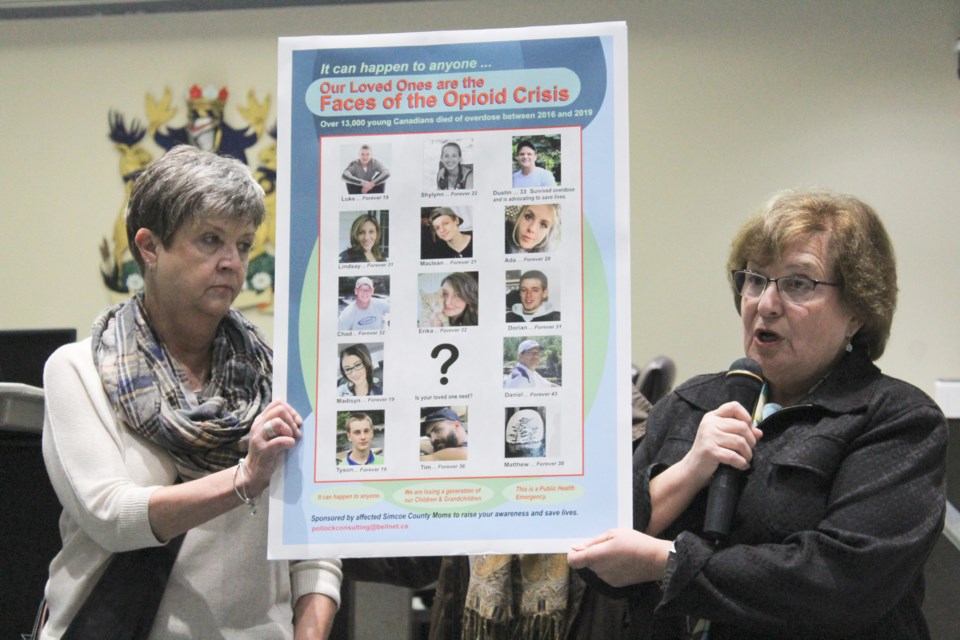The horrific reality of opioid addiction and overdoses in the region was front and centre at a forum Tuesday in Orillia, and while the details are discouraging, they need to be heard, according to Kathy Cole.
Cole’s daughter, Erika, died June 22, 2018, of an accidental overdose.
Mayor Steve Clarke attended Erika’s funeral and made a promise to her mother — that he would try to arrange an educational forum. That happened Tuesday at city hall, where medical professionals, law enforcement officials and residents gathered for a presentation called Opioids and Other Drugs in Our Community.
Health unit officials noted in 2018, there were 76 opioid-related deaths among Simcoe County and Muskoka residents. Of those, 43 were related to fentanyl.
“I learned a lot today,” Cole said, adding she was there to support a group of mothers and grandmothers who have lost children and grandchildren to overdoses.
After Erika died, it took Cole a while to speak publicly about it.
“I couldn’t do a lot for a while. I was grieving — I still am — but there’s a crisis,” she said.
Realizing the scope of the problem led her to seek out more information and to share her experience and that of her daughter.
In 2014, Erika was prescribed Percocet for an injured shoulder. That started her down a road of opioid addiction. She went to detox, “did an amazing job and came out as a hopeful person,” Cole recalled.
That hope faded when a rehab bed could not be found for Cole, and the family didn’t have the $30,000 per month it would cost for private treatment.
“That was a huge problem. She slipped back into it and she never tried to get out of it again,” Cole said. “She just gave up. With the PTSD and depression, she just wanted to sleep.”
It was heartbreaking for Cole to watch her daughter — a caring, intelligent, talented young woman — struggle.
During Tuesday’s event, Cole and others who have lost loved ones to overdose circulated a petition that calls on governments and municipalities to declare an opioid health emergency. Doing so could make funding available to fight the problem.
“We need to do something now,” said Evelyn Pollock, who formed the Forever Campaign, which aims to put faces to the opioid crisis and petition for better care for those who are addicted.
“We want these faces put up all over Simcoe County,” Pollock said, holding a poster bearing the images of those who have died, including her son, Daniel, who lost his life to an accidental overdose in 2017 at the age of 43.
Also on the poster was a photo of Ada Chepyha. Wednesday will mark one year since the 28-year-old’s fatal overdose.
Chepyha detoxed many times, but, like Erika Cole, had trouble finding rehabilitation.
”She had a tough time, but she was a beautiful soul,” said her mother, Esther Malmstrom. “She was very artistic. She had a great sense of humour.”
Those attributes are no match for opioid addiction, which, as the standing-room-only audience heard Tuesday, is indiscriminate.
The panel included pharmacists, doctors, police, public health nurses and others who are involved in the fight against opioids.
There was a time when doctors were encouraged to prescribe opioids, but that has changed, said Kim McIntosh, a family physician with the Couchiching Family Health Team. Now, the College of Physicians and Surgeons of Ontario discourages it.
“Where primary care can play a role is in de-prescribing (opioids),” she said.
There’s a fine line, though. Some doctors were over-cautious, McIntosh noted, and fewer prescriptions led some to seek out opioids on the street.
The stigma associated with opioid use is also a problem, said Robert Cooper, a doctor who runs a methadone clinic in the Orillia Drug Store.
“It’s easy to dismiss drug addicts when you don’t know them,” he said. “It’s hard to dismiss them when you do know them — friends and family.”
When it came time for audience questions, one woman pressed for more foot patrols by police, who could do something as simple as ask people how they’re doing.
Orillia OPP has daily foot patrols, Insp. Veronica Eaton responded, but added that is not the main focus of police when it comes to addiction. A mental health officer and the force’s Community Mobilization Unit, as well as OPP’s involvement with various agencies, can be more effective in the long run.
“There’s a better way for us to do it, and we are doing it,” Eaton said.
Front-line officers, as well as the fire department, are equipped with naloxone, which can temporarily reverse the effects of an overdose. Naloxone kits are also available to the public, free of charge.
Opioids aren’t the only drugs of concern, as OPP Det.-Insp. Alana McCutcheon pointed out. The Canada Border Services Agency reported a 333 per cent increase, from 2017 to 2018, in methamphetamine seizures.
Meth is “incredibly addictive and very inexpensive,” she said, noting, in some cases, it can sell for $1 per tablet on the street. And, it keeps getting cheaper. The cost of one kilogram of meth was $34,000 in 2016. Now, it’s about $15,000.
“It’s important to remember that methamphetamine is in all of our communities,” McCutcheon said.
Tuesday’s forum was organized in partnership with the Simcoe Muskoka Opioid Strategy and the Orillia Drug Strategy Task Group.
For more information about the Simcoe Muskoka Opioid Strategy, click here.
